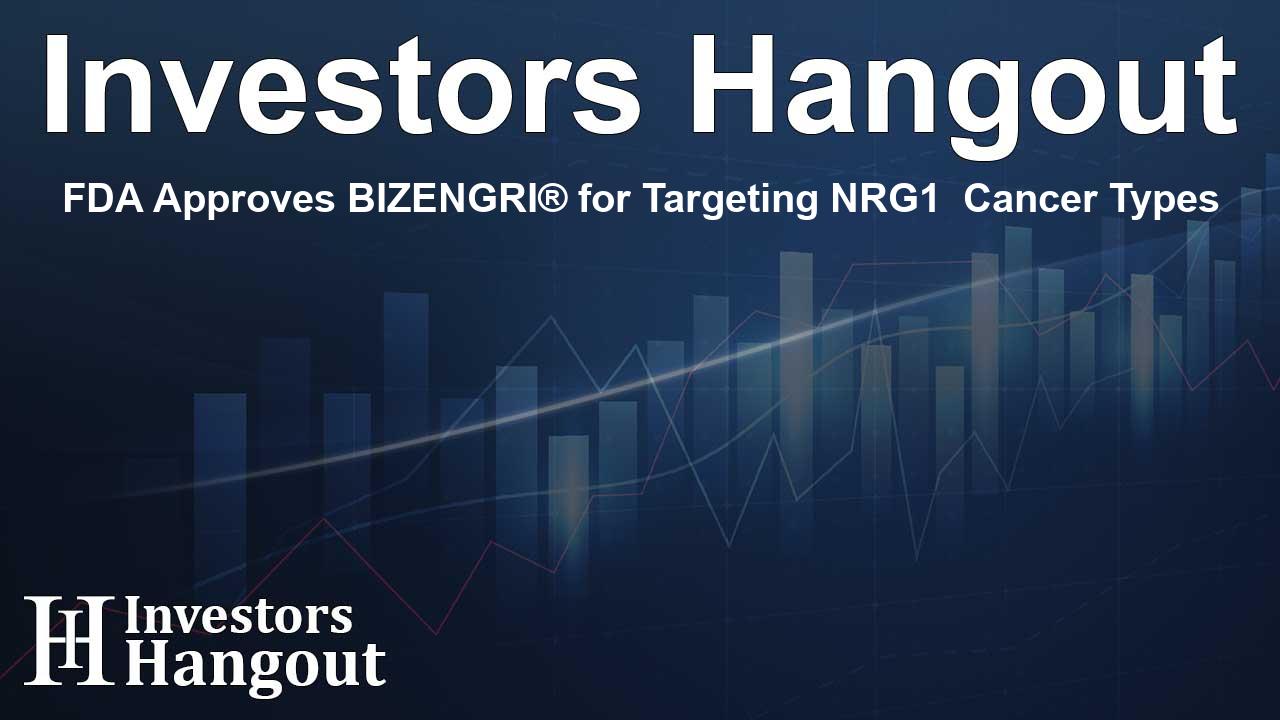FDA Approves BIZENGRI® for Targeting NRG1+ Cancer Types

BIZENGRI® Approved for Targeting NRG1+ Cancers
Merus N.V. (NASDAQ: MRUS) has achieved a significant milestone with the FDA's approval of BIZENGRI® (zenocutuzumab-zbco), making it the first therapy specifically designed for patients battling advanced pancreatic adenocarcinoma and non-small cell lung cancer (NSCLC) with NRG1 gene fusions. This breakthrough therapy caters to those whose cancers have become unresectable or metastatic.
Clinical Study Paves the Way for Approval
The approval was granted based on comprehensive safety and efficacy data derived from the eNRGy study, a multicenter, open-label clinical trial. This trial recruited patients with advanced NRG1+ pancreatic adenocarcinoma and NSCLC who had shown disease progression after prior treatments. Data reflected promising outcomes, with an objective response rate (ORR) of 40% in pancreatic adenocarcinoma patients and 33% for those with NSCLC.
Importance of the eNRGy Trial
Within the eNRGy trial, which included 30 participants with pancreatic adenocarcinoma, the duration of response (DOR) ranged impressively from 3.7 to 16.6 months. In the NSCLC group, encompassing 64 patients, DOR averaged 7.4 months. The trial’s design ensures rigorous assessment of BIZENGRI’s effects, measuring outcomes through Response Evaluation Criteria In Solid Tumors (RECIST) v1.1, validated by independent reviews.
Impact on Patients and Clinical Significance
With the introduction of BIZENGRI®, there is renewed hope for patients affected by NRG1+ cancers, who previously lacked targeted therapies. This launch not only represents a significant shift in treatment but also fulfills an unmet medical need. BIZENGRI® will be available in clinical settings shortly, providing much-needed access to those with limited options.
Expert Insights on Approval
Dr. Alison Schram, a notable oncologist at Memorial Sloan Kettering Cancer Center, highlighted the potential of BIZENGRI® to yield improved outcomes for cancer patients experiencing these aggressive forms of cancer. The approval marks a pivotal point in understanding and treating NRG1+ cancers.
Merus’s Vision and Future Prospects
Shannon Campbell, Chief Commercial Officer of Merus, elaborated on the significance of BIZENGRI® as the company's inaugural approved medicine stemming from their pioneering Biclonics® technology platform. This event underscores their commitment to advancing multispecific therapies and enhancing patient care. The company is dedicated to expanding access to BIZENGRI® through supportive services tailored to individual patient needs.
Ongoing Commitment to Patient Safety
As with any groundbreaking treatment, the safety profile of BIZENGRI® comes with important considerations. It carries a boxed warning regarding potential embryo-fetal toxicity, necessitating effective contraception for patients of reproductive potential during treatment. Monitoring for serious adverse reactions, including infusion-related reactions and interstitial lung disease, is crucial to ensuring patient well-being.
Patient Support Programs
To assist with the transition to treatment, PTx Assist™ offers resources, educational materials, and support for managing insurance and financial assistance. Patients and providers can access help through dedicated support lines during business hours.
Conclusion
In summary, the approval of BIZENGRI® signifies a groundbreaking advancement in treating NRG1+ pancreatic adenocarcinoma and NSCLC, setting a new standard for targeted therapies. Merus N.V. stands at the forefront of innovation in oncology, working diligently to improve outcomes and enrich the lives of patients through their therapeutic offerings.
Frequently Asked Questions
What is BIZENGRI® used for?
BIZENGRI® is approved for the treatment of adults with advanced pancreatic adenocarcinoma and NSCLC that harbor NRG1 gene fusions.
How does BIZENGRI® work?
BIZENGRI® is a bispecific antibody that inhibits the binding of neuregulin 1 to HER3, thereby reducing cancer cell proliferation.
What were the outcomes of the eNRGy trial?
The trial results indicated that BIZENGRI® provided a 40% objective response rate in pancreatic adenocarcinoma and a 33% response in NSCLC patients.
What safety concerns are associated with BIZENGRI®?
Safety concerns include potential infusion-related reactions, embryo-fetal toxicity, and interstitial lung disease, among others.
How can patients access BIZENGRI®?
Patients can access BIZENGRI® through healthcare providers, with support programs available to help navigate treatment logistics.
About Investors Hangout
Investors Hangout is a leading online stock forum for financial discussion and learning, offering a wide range of free tools and resources. It draws in traders of all levels, who exchange market knowledge, investigate trading tactics, and keep an eye on industry developments in real time. Featuring financial articles, stock message boards, quotes, charts, company profiles, and live news updates. Through cooperative learning and a wealth of informational resources, it helps users from novices creating their first portfolios to experts honing their techniques. Join Investors Hangout today: https://investorshangout.com/
Disclaimer: The content of this article is solely for general informational purposes only; it does not represent legal, financial, or investment advice. Investors Hangout does not offer financial advice; the author is not a licensed financial advisor. Consult a qualified advisor before making any financial or investment decisions based on this article. The author's interpretation of publicly available data shapes the opinions presented here; as a result, they should not be taken as advice to purchase, sell, or hold any securities mentioned or any other investments. The author does not guarantee the accuracy, completeness, or timeliness of any material, providing it "as is." Information and market conditions may change; past performance is not indicative of future outcomes. If any of the material offered here is inaccurate, please contact us for corrections.